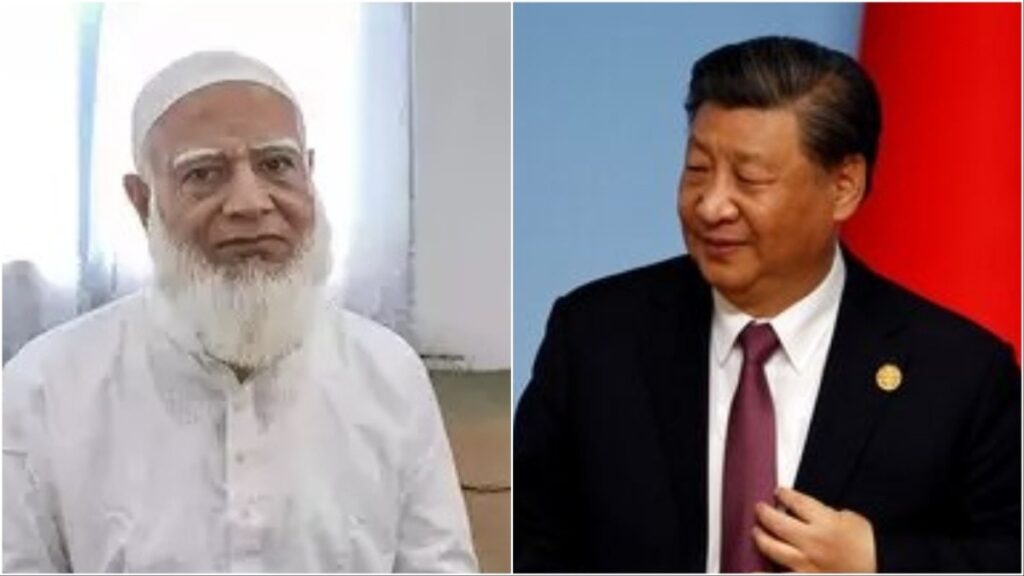India, which is surrounded by neighbouring rivals like Pakistan and China, is now facing further problems due to the change of power in Bangladesh. Before 4 August, Bangladesh was a close and trusted friend of India but after the coup of Prime Minister Sheikh Hasina, the whole situation has changed. Now China has started increasing its friendship with the new government of Bangladesh and influential Islamic parties, which is a sign of danger for India.
On Monday, Chinese Ambassador Yao Wen visited the office of Jamaat-e-Islami Bangladesh (JIB) at Moghbazar in Dhaka and praised it. He said that Jamaat-e-Islami is a well-organized party.
Jamaat-e-Islami, which has an anti-India stance, is the largest Islamic party in Bangladesh and the Sheikh Hasina government had banned this party. Now the interim government of Bangladesh has lifted the ban on the party and said that no evidence has been found of its involvement in terrorist activities.
This is the first diplomatic meeting of a Chinese ambassador with the JIB party since the war crimes investigation against Jamaat-e-Islami Bangladesh (JIB) began in 2010.
Controversial history of Jamaat-e-Islami
Jamaat-e-Islami Bangladesh has its roots in the Jamaat-e-Islami movement founded in 1941 in British India. It has been a controversial party in Bangladesh’s history. The party opposed Bangladesh’s independence in 1971 and sided with the Pakistani army during the Liberation War, which left an indelible stain on its reputation.
The party had supported the atrocities committed by paramilitary forces like Al-Badr and Razakars during the Liberation War. The Bangladesh government initiated war crimes trials in the 2000s in which many of its leaders were convicted and hanged. The JIB was also banned after Bangladesh’s independence.
Despite its tarnished image, the Jamaat-e-Islami Party has managed to retain its political influence. The party has kept itself afloat by forming an alliance with the Bangladesh opposition party, the Bangladesh Nationalist Party (BNP) and its student wing, Islami Chhatra Shibir.
China is trying to increase its influence in Bangladesh
China had deep ties with Sheikh Hasina’s party Awami League and is now trying to increase its involvement with the interim government of Bangladesh and political parties like Jamaat-e-Islami. China is trying to increase its influence in Bangladesh in any way, regardless of the political party in power.
This development is worrying for India. Bangladesh is a very important country for India, given its geopolitical importance, its proximity to India and its role in South Asian politics.
In such a situation, China’s increasing ties with a party like Jamaat-e-Islami can weaken India’s efforts to build strong and stable relations with Bangladesh. This is also because the Jamaat-e-Islami party has historically been irritated by India’s influence in Bangladesh.
However, Jamaat-e-Islami chief Shafiqur Rahman, while talking to news agency PTI, said that he wants stable relations with India. But he also said that India should avoid interfering in the internal affairs of Bangladesh.
He emphasised that while the Jamaat supports strong India-Bangladesh ties, Bangladesh should also leave behind the “burden of the past” and work to maintain strong and balanced relations with countries like the US, China and Pakistan.
Jamaat-e-Islami wants to make Bangladesh an Islamic country
Jamaat-e-Islami has been advocating to make Bangladesh an Islamic country governed by Sharia law. The party had strongly opposed India’s role in the liberation of Bangladesh. And now its growing ties with China are not good news for India.
Although the party has not shown an anti-India stance in recent years, it has sometimes been critical of India’s influence in Bangladesh.
Apart from this, Jamaat-e-Islami has been accused of promoting extremist ideologies and supporting terrorist activities. The strength gained by the party after the fall of the Sheikh Hasina government can give rise to radicalism and instability in the region.
If the party comes to power with China’s support, it will form a government in Bangladesh that may not be willing to cooperate with India on issues of terrorism, border security and regional stability.
China’s investment in Bangladesh and India’s growing concern
China has invested in several infrastructure and development projects in Bangladesh under its ambitious project ‘Belt and Road Initiative’ (BRI) which gives it a strategic advantage in Bangladesh. Under the new government, China can speed up the BRI in Bangladesh which will reduce India’s influence there and create a regional imbalance which will be in favor of China.
According to a report in Bangladesh’s The Daily Star newspaper, on September 1, the interim government’s foreign affairs adviser Tauheed Hussain said that the MoUs signed with India in June could be reconsidered if they were not in the interest of the nation. During the visit of then Prime Minister Sheikh Hasina to India on June 22, the two countries signed ten MoUs, including seven new agreements and renewal of three existing ones.
In such a situation, India will have to be cautious about the growing friendship between China and Jamaat-e-Islami Bangladesh.
Source (PTI) (NDTV) (HINDUSTANTIMES)
